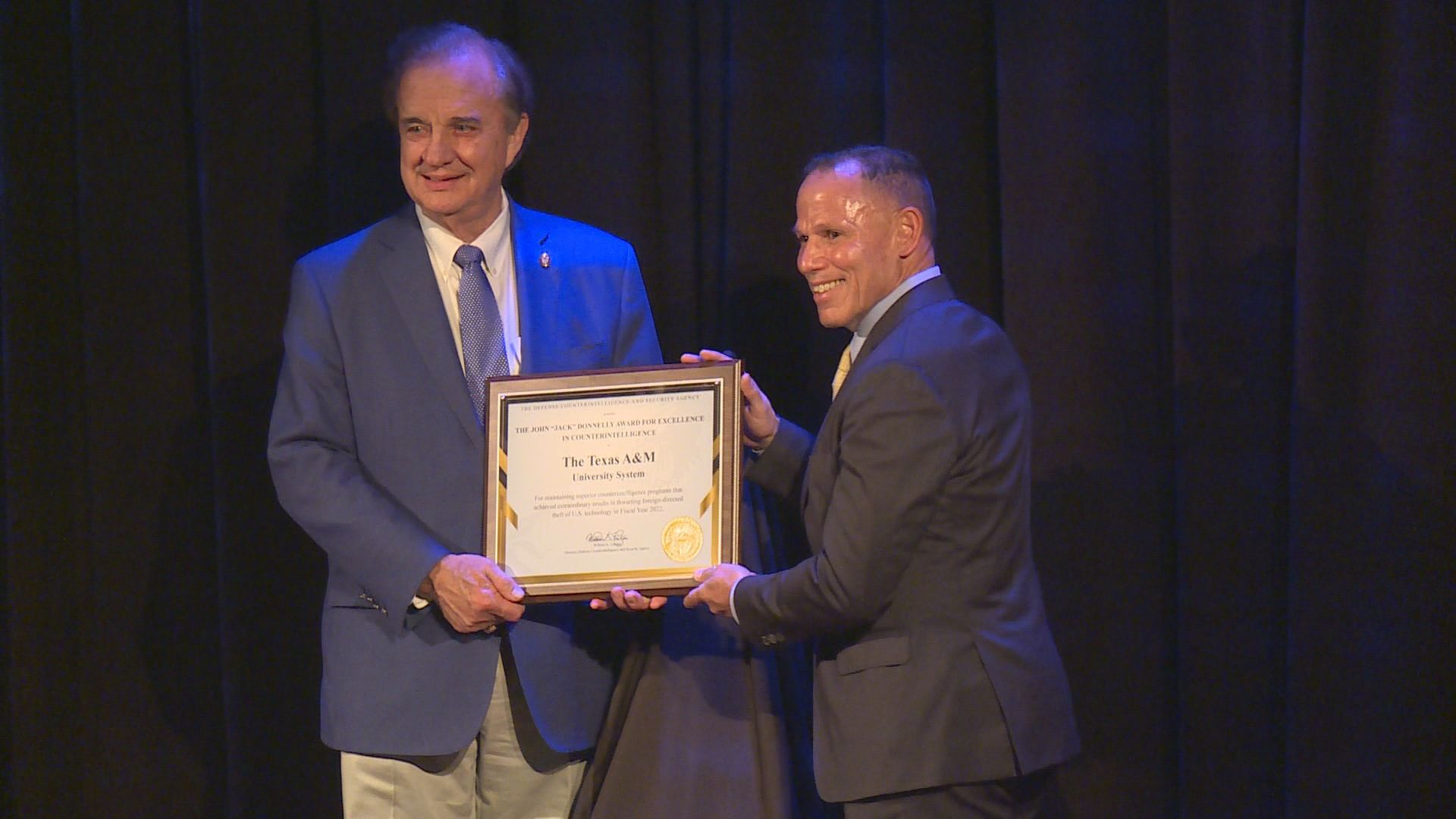Texas A&M System wins award for national security leadership, counterintelligence excellence
COLLEGE STATION, Texas (KBTX) – At a ceremony Monday afternoon at the George H. W. Bush Presidential Library and Museum, The Texas A&M University System received a significant accolade as Major General Daniel J. Lecce, USMC (Ret.), the acting director of the Defense Counterintelligence and Security Agency of the U.S. Defense Department, presented A&M with the coveted Jack Donnelly Award for Excellence in Counterintelligence.
The award recognizes A&M’s outstanding commitment to national security and its unwavering dedication to protecting sensitive information.
Chancellor John Sharp accepted the award on behalf of the Texas A&M University System, expressing gratitude for the recognition, stating, “The Texas A&M System takes security very seriously, and we appreciate the recognition. We will continue our diligent work to stay ahead of the malicious governments and rogue organizations who seek to access the sensitive work we have been trusted to do.”
In addition to receiving the Jack Donnelly Award, the Texas A&M System was previously honored with the Cogswell Award earlier this year. This accolade recognizes the System as having one of the nation’s leading industrial security programs, standing out among more than 12,500 corporate and academic entities.
The full news release from the Texas A&M University System is shared below:
The leader of a federal intelligence agency presented an award Monday to The Texas A&M University System for being a national leader in counterintelligence and protecting sensitive information.
Major General Daniel J. Lecce, USMC (Ret.), the acting director of the Defense Counterintelligence and Security Agency of the U.S. Defense Department, traveled to College Station for an award ceremony at the George H. W. Bush Presidential Library and Museum.
Lecce presented Chancellor John Sharp with the Jack Donnelly Award for Excellence in Counterintelligence. The award is given only to entities that are cleared by the federal government to deter, detect and disrupt the theft of classified information. The award is named after John “Jack” Donnelly, who served as the Director of the Defense Investigative Service from 1988 to 1996.
“The Texas A&M System takes security very seriously, and we appreciate the recognition,” Sharp said. “We will continue our diligent work to stay ahead of the malicious governments and rogue organizations who seek to access the sensitive work we have been trusted to do.”
DCSA’s Excellence in CI Award recognizes highly mature and effective counterintelligence industry programs that enhance national security and promote uncompromised delivery of sensitive and classified services and capabilities to the Department of Defense and other U.S. government agencies. DCSA considers cleared companies with the most impressive CI capability and U.S. government cooperation to deter, detect and disrupt foreign entities’ theft of sensitive or classified information and technology.
The System was also selected from over 12,500 corporate and academic entities. for the agency’s Cogswell Award earlier this year. The accomplishment recognizes the System as having one of the nation’s leading industrial security programs.
Dr. Kevin Gamache, chief research security officer, leads the Research Security Office of the Texas A&M System and works hard to protect critical defense information, products and research. Gamache also manages the System’s security relationships with the Departments of Defense and Energy and has earned the Industrial Security Professional® designation.
“Prominent research universities receive billions of research dollars annually from federal entities to push the limits of science and make America safer,” Gamache said. “The threat of our most critical emerging technology finding its way into weapon systems developed by our adversaries is real, and U.S. higher education institutions must guard against it.”
Dr. Gamache and his team remain on the front lines to protect the Texas A&M System, which conducts approximately $1.2 billion in research expenditures annually.







